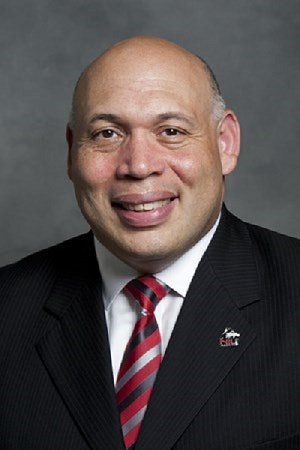With the number of COVID-19 cases rising in states that eased social distancing protocols, Sean T. Frazier, associate vice president and director of athletics at Northern Illinois University (NIU), saw hopes dim for the start of college sports in the fall. Still, he’s determined to not only navigate these challenging times, but to forge a positive and enlightened future. Vice president and director of athletics at Northern Illinois University (NIU), saw hopes dim for the start of college sports in the fall. Still, he’s determined to not only navigate these challenging times, but to forge a positive and enlightened future.
 Sean T. Frazier
Sean T. Frazier“It does not look positive, so that has changed the cause and effect on the industry of higher education and specifically college athletics,” said Frazier, who has been at NIU since 2013. “We’re at a point…of making a decision about playing fall sports. It’s created a lot of angst because [of] the financial repercussions and the health and safety repercussions.”
Frazier said student-athletes will not be back in action until doctors and clinicians say it’s safe. “If we don’t have data and we don’t have institutional support to be able to do that, then we won’t be bringing them back to compete,” he said.
In Illinois, the governor will determine if students can return to campus. The DeKalb County Health Department will also have a say in the matter. As of now, it appears the NIU campus will be open, but with social distancing protocols in place. Some lectures will remain virtual, but where possible, there will be some hybrid courses. Frazier said the university must see that risk is at a minimum before competitive sports resume.
Each day brings news of institutions and conferences canceling fall sports because of the pandemic.
“The financial side will be devastating to the model that we have in college athletics, which I think for a long time needed a change, a tweak,” Frazier said. “This is a watershed moment and a great time to reset the priorities relative to how sports are managed from a revenue and expense [standpoint.]”
Frazier and NIU’s athletic department have some experience dealing with challenging circumstances. In 2015–17, for instance, NIU had to carefully examine its priorities when there was no state budget, forcing its athletic department to look at revenue streams, sports offerings and staffing.
“This is a new monster. … Should one or two sports drive an entire athletics program?” Frazier said. “We should take a look at the revenues around monetizing what we do athletically, but also take a look at salaries and facilities and debt service. Some institutions have over-leveraged themselves. A total review is healthy for college athletics and for higher ed, and I think this is an opportunity to right side some of the things that have been done in some institutions operating outside of their means,” he added. “It’s the right time to have those conversations during this crisis.”
At NIU, a big focus since student-athletes left campus in March has been mental health. Some student-athletes have been struggling, particularly as issues related to race and racism have escalated across the country. NIU has tried to provide supports for student-athletes, coaches and staff. There is also an increased amount of communication around COVID-19 and the stresses that come with uncertainty.
Given his background in diversity and inclusion, Frazier has reached out on the national level to provide insights to others in intercollegiate athletics on how to develop and effectively implement diversity and inclusion initiatives.
Should fall sports be canceled at NIU, athletic scholarships will be honored so that student-athletes can continue their studies. Frazier anticipates that the athletic program will go into a revised scenario where student-athletes will be on campus to train, but still social distance.
“It will be a modified, non-traditional setting where they can keep their training and fitness level so at some point, they will be able to compete,” he said. “We want to make sure they do it in a safe and healthy environment and make sure when we’re ready to go back to competition, we won’t have to have a six-to-nine-month start up from day one. We’ll keep people in a regimen of working out and being in top physical ability.”
The NIU athletic budget has already been revised. Frazier, the football coach and the men’s and women’s basketball coaches have taken pay cuts and all the sports have seen budget reductions. He suggested all athletic departments always keep their eyes on revenue generation, which NIU has done since 2015.
“Think outside the box and not just think about philanthropy as the sole way to subsidize an operational budget,” he said. “We have to put things in place that produce and bear fruit annually in a way where we can have some level of sustainability. We’ve learned even further and redefined some of the things we do.”
Frazier said he and his staff are constantly reviewing expenses. There is also strategic development on how to engage fans if sports come back without spectators.
“During this COVID-19 virtual reality, we constantly have to have these conversations,” Frazier said. “Things are not going to be the same coming back to a face-to-face environment.”





















